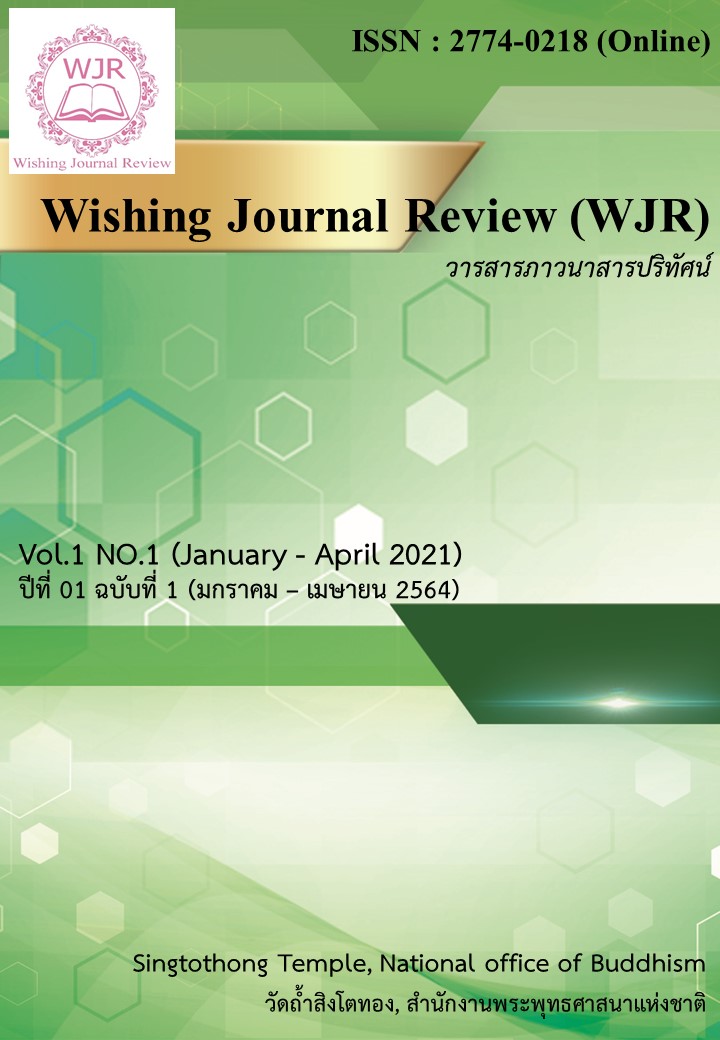The development of morality and ethics of Generation Y people according to the concept of sociology
Keywords:
Morality and ethics, Generation Y, Concept of sociologyAbstract
Morality and ethics are good things that are accepted by society, which arises from the public and education, actions until the birth is a habit and It is the restraint and control over the behavior of the person who expresses their desire in response to the desires, which is the process of developing oneself to perfection in the body, speech and mind. The concept of sociology is a concept that focuses on the study of social interaction processes and patterns of relationships between human beings in organization and society. The morality and ethics development of human beings can occur through socialization such as parenting and good parenting practices, teaching and training from teachers, teaching from monks, learning from peer groups and learning from the media, etc. This birth of morality and ethics occurs through a 4-step process consist of imitation, instruction, copying, and self-moralizing. The principles of morality and ethics that are a model for life are diligence, frugal, honesty, discipline, health, cleanliness and harmony. Among the world in this social age, the generation Y people are the ones that will be the most important human resource of the country caused understanding of their roles and duties is the development of morality and ethics, because morality and ethics will be an island to prevent from doing evil. Therefore, the guidelines for morality and ethics development through a variety of strategies include 1) the cultivation of morality and ethics in the educational curriculum, 2) the instillation by the family institute, 3) the use of religious principles as a guideline for morality and ethics upbringing, and 4) a model of morality and ethics instillation by the community. This will lead to a society that coexists with happiness and to achieve stability, wealth and sustainability.
References
กรมการศาสนา. (2561). คุณธรรมจริยธรรม. กรุงเทพฯ: โรงพิมพ์ชุมชนสหกรณ์การเกษตรแห่งประเทศไทย.
กรมวิชาการ. (2559). คู่มือการสร้างเครื่องวัดคุณลักษณะด้านจิตพิสัย. (พิมพ์ครั้งที่ 2). กรุงเทพฯ: คุรุสภา.
กระทรวงวัฒนธรรม. (2560). โครงการยกย่องชูเกียรติบุคคลและสถาบันดีเด่นทางวัฒนธรรมของสำนักงานคณะกรรมการวัฒนธรรมแห่งชาติ. สืบค้น 22 กุมภาพันธ์ 2564. จาก : http://www.m-culture.go.th.
กระทรวงศึกษาธิการ. (2560). การจัดการเรียนรู้รูปแบบกระบวนการแก้ปัญหา. กรุงเทพฯ: โรงพิมพ์ชุมชนสหกรณ์การเกษตรแห่งประเทศไทย.
กีรติ บุญเจือ. (2557). จริยศาสตร์สำหรับผู้เริ่มเรียน. กรุงเทพฯ: สำนักพิมพ์ไทยพานิช.
กุลทราภรณ์ สุพงษ์ และสิริอร จุลทรัพย์. (2562). การศึกษาเพื่อพัฒนาคุณธรรมตามหลักพุทธศาสนา.
e-Journal of Education Studies, Burapha University, 1(4): 1-13.
จรรยา ลินเลา. (2562). กระบวนการพัฒนาตนตามหลักคุณธรรมจริยธรรม. บัณฑิตศึกษาปริทรรศน์ วิทยาลัยสงฆ์นครสวรรค์, 7(2): 169-176.
ดวงเดือน พันธุมนาวิน. (2557). การพัฒนาจริยธรรมของประชาชนไทย. (พิมพ์ครั้งที่ 2). กรุงเทพฯ: มหาวิทยาลัยศรีนรินทรวิโรฒประสานมิตร.
พรพิทักษ์ เห็มบาสัตย์ และ วรรณพล พิมพะสาลี. (2563). แนวทางการปลูกฝังคุณธรรมจริยธรรมในสังคมไทย. วารสารด้านการบริหารรัฐกิจและการเมือง, 9(2): 63-80.
พระธรรมกิตติวงศ์ (ทองดี สุรเตโช). (2557). พจนานุกรมเพื่อการศึกษาพุทธศาสตร์ชุดคำวัด. (พิมพ์ครั้งที่ 3). กรุงเทพฯ: พิมพ์ลักษณ์.
พระมหาอนันต์ องฺกุรสิริ. (2561). คุณธรรมจริยธรรมกับการพัฒนาผู้เรียนในยุคไทยแลนด์ 4.0. วารสารนวัตกรรมการศึกษาและการวิจัย, 2(2): 81-90.
พระมานรินทร์ สุรปญฺโญ (เอมพันธ์). (2562). การพัฒนาคุณธรรมจริยธรรมของผู้นำตามแนวพุทธ. วารสารชัยภูมิปริทรรศน์, 2(1): 28-37.
พัชสิรี ชมพูคำ และณัฐธิดา จักรภีร์ศิริสุข. (2563). ปัจจัยที่มีอิทธิพลต่อความพึงพอใจและแรงจูงใจในการทำงาน: กรณีศึกษาเปรียบเทียบคนเจเนอเรชัน Y และเจเนอเรชัน Z ในเขตกรุงเทพมหานคร.จุฬาลงกรณ์ธุรกิจปริทัศน์, 42(3): 1-18.
มกราพันธ์ จูฑะรสก และศุกร์ใจ เจริญสุข. (2562). การพัฒนารูปแบบการส่งเสริมคุณธรรมจริยธรรมในองค์กร. วารสารวิชาการธรรมทรรศน์, 19(4): 167-179.
ศิลาวัฒน์ ชัยวงศ์. (2561). จริยธรรมของนักการเมืองในระบบการเมืองไทย. วารสารสังคมศาสตร์ปริทรรศน์, 1(6): 1-15.
ศุทธกานต์ มิตรกูล และอนันต์ชัย คงจันทร์. (2559). เจนเนอเรชันวายในองค์กร: การศึกษาความสัมพันธ์ระหว่างความสอดคล้องของค่านิยมและความผูกพันต่อองค์กร. วารสารวิทยาการจัดการ,
33(1): 51-75.
สมบูรณ์ ชิตพงศ์. (2558). คุณธรรมและจริยธรรม. (พิมพ์ครั้งที่ 3). กรุงเทพฯ: ห้างหุ้นส่วนจำกัด อรุณการพิมพ์.
สำนักงานรัฐบาล อิเล็กทรอนิกส์. (2560). Thailand Digital Government 2021. สืบค้น 24 กุมภาพันธ์2564, จาก : https://www.ega.or.th/th/profile/2035/
อ้อมเดือน สดมณี และฐาสุกร์ จันประเสริฐ. (2557). การพัฒนาคุณธรรม จริยธรรม: จากแนวคิดสู่การปฏิบัติ. วารสารพฤติกรรมศาสตร์, 17(1): 20-32.
Bloom, L., & Selznick, P. (1968). Sociology. New York: Harper & Row.



